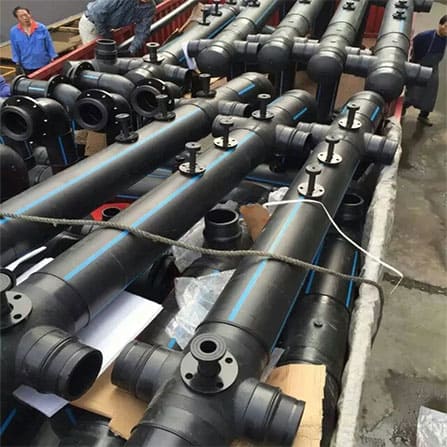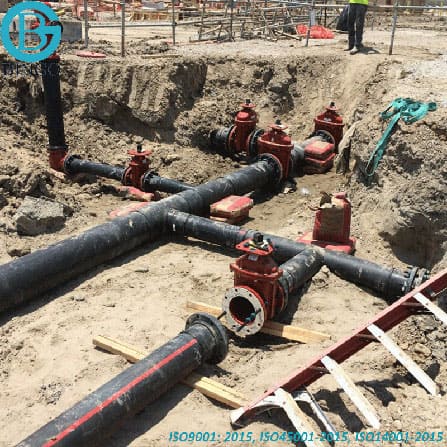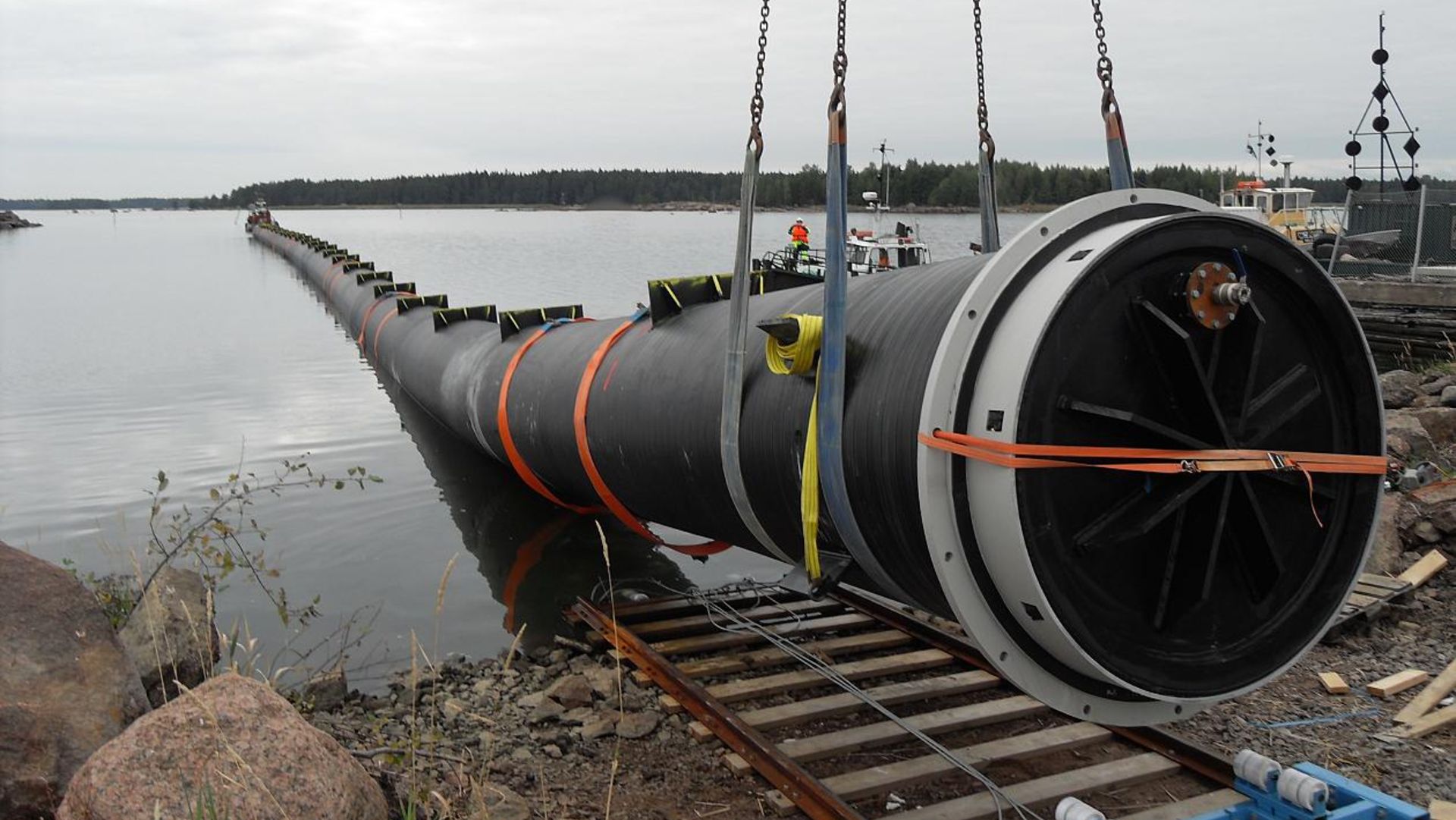HDPE Pipe Supplier tips for ensuring quality assurance
Discovering the Leading Pipeline Manufacturers: Quality, Reliability, and Technology
The pipeline manufacturing industry stands at the crossway of quality, advancement, and dependability, driven by leading companies such as Tenaris and Vallourec. These producers are not just committed to creating high-performance products but are also pioneering lasting techniques that deal with contemporary ecological concerns (Pipeline Manufacturer). As we analyze the requirements that specify excellence in pipeline services, it becomes apparent that the landscape is quickly advancing. What details developments are emerging, and exactly how are these improvements shaping the future of pipeline framework? The answers may redefine market criteria in means that are not yet totally recognized
Leading Manufacturers Introduction
In the domain of pipeline manufacturing, numerous principals become leaders, each adding substantially to the market's landscape. Companies such as Tenaris, Vallourec, and JFE Steel have actually developed themselves as frontrunners by constantly delivering top quality items that fulfill strict industry standards. Tenaris, renowned for its innovative solutions, specializes in smooth and bonded pipelines, providing largely to the oil and gas market. Vallourec, a French international, concentrates on the production of costs tubular services, highlighting sustainability and advanced technology in its manufacturing processes.
In A Similar Way, JFE Steel, a major Japanese manufacturer, is acknowledged for its extensive series of steel pipelines, particularly those made use of in energy and framework jobs. Their dedication to study and development has actually enabled them to generate high-performance materials that stand up to severe ecological conditions. Furthermore, companies like united state Steel and National Oilwell Varco have increased their market presence by expanding their product offerings and improving operational efficiencies.
These leading manufacturers not only dominate the marketplace but likewise drive innovation within the market, establishing benchmarks for top quality and dependability that players desire attain. Their contributions are crucial for fulfilling the raising need for durable and reliable pipeline solutions worldwide.
Standards for Top Quality Analysis
Quality evaluation in pipeline manufacturing hinges on two essential criteria: material longevity standards and producing procedure efficiency. Guaranteeing that products fulfill strenuous toughness standards is important for the longevity and integrity of pipelines. Additionally, enhancing the manufacturing process can enhance performance while keeping top quality, inevitably affecting general efficiency and safety.
Material Sturdiness Criteria
Guaranteeing the longevity and reliability of pipeline materials is essential for keeping framework honesty and functional effectiveness. Material durability standards play an essential role in evaluating the top quality of pipes, dictating the performance and life-span of the products utilized in building. Manufacturers need to comply with a variety of extensive requirements, including those set by organizations such as ASTM International and the American Oil Institute (API)
These criteria assess different aspects, including corrosion resistance, tensile stamina, and tiredness efficiency. Pipes used in harsh atmospheres require products that can withstand chemical destruction, while those subjected to high-pressure conditions must display phenomenal tensile strength.
In addition, factors such as temperature fluctuations and environmental conditions need to be thought about, as these can substantially affect product behavior with time. Manufacturers often utilize innovative testing techniques, including accelerated aging tests, to mimic long-lasting wear and warranty that materials exceed or satisfy sector benchmarks.
Manufacturing Process Performance
Manufacturers' ability to enhance making procedure efficiency is crucial for generating top notch pipes that meet strict market criteria. Efficiency in producing directly affects price monitoring, production timelines, and overall product stability. To attain this, leading pipeline manufacturers execute sophisticated techniques such as lean manufacturing, automation, and real-time data analytics.
Lean producing concepts are necessary in reducing waste and making best use of source use. By enhancing processes and getting rid of redundancies, makers can enhance performance while making sure constant top quality. Automation innovations, consisting of robotics and computer system mathematical control (CNC) makers, play a critical duty in enhancing accuracy and decreasing human error, thereby raising the reliability of the end product.
In addition, using real-time information analytics allows makers to monitor manufacturing processes continuously, enabling them to determine traffic jams and make timely modifications. This aggressive method not just improves performance yet likewise supports quality control procedures by ensuring conformity with governing requirements.
Reliability in Pipeline Solutions
Integrity in pipeline services is vital, as it straight impacts the safety and security and effectiveness of fluid transportation systems. Trick variables include the sturdiness of materials made use of, adherence to extensive screening and accreditation requirements, and the incorporation of ingenious material options that enhance efficiency. Understanding these components is vital for manufacturers aiming to supply reliable pipeline facilities.
Significance of Resilience
Attaining resilience in pipeline options is crucial, as it directly influences the lasting efficiency and safety of facilities. Long lasting pipelines are crucial for reducing upkeep costs and lowering the chance of devastating failings. This dependability is specifically crucial in markets such as oil and gas, water supply, and wastewater monitoring, where the effects of pipeline failing can be severe, both economically and environmentally.
The materials and making procedures utilized by pipeline producers play a substantial role in figuring out the durability of the end product. Making use of high-grade basic materials, progressed innovations, and innovative layout concepts assures that pipelines can withstand different stress factors, consisting of stress fluctuations, temperature variations, and corrosive environments.
Furthermore, the longevity of pipes is very closely connected to their capacity to stand up to exterior factors such as soil motion, seismic task, and chemical exposures. Efficient corrosion protection approaches, such as coatings and cathodic protection, further boost the long life of pipelines, protecting them against deterioration over time.
Buying long lasting pipeline services ultimately converts to raised operational performance, reduced downtime, and improved safety, attesting the crucial importance of sturdiness in modern pipeline manufacturing.
Testing and Qualification Criteria
In the domain name of pipeline remedies, strenuous testing and accreditation requirements are crucial to assure the integrity and safety and security of infrastructure. These standards serve as criteria for evaluating the efficiency and sturdiness of pipeline materials and systems, verifying they meet certain regulatory and market requirements.
Testing processes generally incorporate various approaches, including pressure screening, hydrostatic analyses, and non-destructive screening methods. These evaluations are essential for determining possible weaknesses or flaws in the products prior to they are deployed in real-world applications. Additionally, qualification by recognized organizations assurances that manufacturers stick to developed standards, which cultivates trust among stakeholders, consisting of contractors, designers, and end-users.
Several leading pipeline suppliers participate in continuous surveillance and enhancement of their screening protocols to adjust to developing sector requirements and technical advancements. Conformity with standards such as ASTM, ASME, and ISO not just enhances product dependability yet additionally minimizes the risk of environmental cases related to pipeline failures.
Innovative Product Solutions
The growth of ingenious material options has actually transformed the landscape of pipeline manufacturing, enhancing both performance and durability. Advanced materials such as high-density polyethylene (HDPE), cross-linked polyethylene (PEX), and composite products have become game-changers, offering premium resistance to deterioration, temperature variations, and stress variants. These products not only extend the life-span of pipelines but likewise lower maintenance prices, making certain reputable lasting efficiency.
Manufacturers are significantly embracing smart products that integrate sensors for real-time monitoring. This modern technology enables proactive upkeep, significantly boosting reliability by detecting leakages or structural weak points before they intensify right into important failures. The assimilation of nanotechnology has additionally resulted in the growth of coverings that boost the toughness of pipelines against abrasion and chemical direct exposure.
Sustainability is another vital focus, with makers exploring bio-based composites and recyclable materials that lessen environmental impact. As regulatory standards proceed to develop, the emphasis on innovative product services becomes paramount in conference stringent safety and environmental needs. Inevitably, these improvements not just enhance the dependability of pipeline systems however also add to the total efficiency and sustainability of energy transport facilities.
Technologies in Pipeline Technology
Advancements in pipeline modern technology are revolutionizing the industry by improving performance, security, and environmental sustainability. Current improvements focus on clever pipeline systems that make use of sensors and IoT modern technology to keep an eye on conditions in actual time, making it possible for proactive maintenance and reducing the risk of failures. These systems can identify leakages, stress adjustments, and various other abnormalities, permitting fast action and lessening ecological effect.
Furthermore, the advancement of innovative products, such as composite and corrosion-resistant alloys, considerably extends the life-span and integrity of pipes. HDPE Pipe Supplier (American Plastics LLC HDPE Pipeline Manufacturer). These materials reduce maintenance costs and boost performance in rough environments, making them perfect for gas, oil, and water transport
Moreover, automation and robotics are playing a crucial function in pipeline building and construction and assessment. Drones and robotic devices help with studies and look at this website assessments of hard-to-reach locations, making sure comprehensive assessments without jeopardizing safety.
Moreover, ingenious styles, such as modular pipeline systems, permit better versatility in setup and modification, accommodating the vibrant needs of the power sector. Together, these technical improvements not only enhance functional efficiency but additionally add to a much more lasting and durable pipeline facilities, paving the means for a greener future.
Situation Studies of Success
Throughout different sectors, effective applications of innovative pipeline technologies demonstrate significant renovations in functional efficiency and security. One significant instance is the deployment of smart pipeline tracking systems in the oil and gas sector, where real-time information analytics have actually reduced leak detection times by over 50%. This not only lessens ecological risks but also improves the general stability of pipeline facilities.

Additionally, a major manufacturer applied robot assessment technologies in its pipeline upkeep operations, causing a 40% renovation in inspection efficiency. This strategy has structured upkeep routines and considerably reduced downtime.
These study highlight just how prominent pipeline producers are leveraging innovative technologies to promote integrity and operational excellence, inevitably establishing new criteria for the market. As these successes remain to unfold, they lead the way for additional innovations in pipeline manufacturing and monitoring.

Ecological Sustainability Practices
Frequently, pipeline producers are focusing on environmental sustainability practices to reduce their eco-friendly impact and boost the longevity of their items. This dedication is mirrored in various initiatives focused on minimizing waste, saving power, and making use of sustainable materials throughout the manufacturing procedure.

Lots of suppliers are taking on advanced modern technologies that minimize emissions and energy intake. The combination of automated systems and energy-efficient machinery helps simplify manufacturing while decreasing reliance on fossil gas. In addition, business are increasingly turning to eco-friendly products, such as recycled metals and bioplastics, which not just minimize the environmental impact yet likewise promote a round economy.
Pipeline manufacturers are executing rigorous lifecycle evaluations to evaluate the ecological effects of their products from inception to disposal. This strategy allows them to determine possibilities for renovation and foster liable sourcing and waste monitoring practices.
Cooperation with environmental companies even more boosts these initiatives, as producers seek to align their procedures with worldwide sustainability objectives. Ultimately, these ecological sustainability practices not just contribute to a much healthier planet however also setting manufacturers as accountable leaders in the sector, appealing to environmentally conscious stakeholders and clients alike.
Future Patterns in Pipeline Manufacturing
As the demand for a lot more sustainable and reliable infrastructure grows, pipeline manufacturing is poised for substantial developments that will certainly improve the industry. Trick patterns anticipated in the coming years consist of the combination of innovative products, such as corrosion-resistant and composite alloys, which boost resilience while lessening ecological influence. Manufacturers are likewise anticipated to take on ingenious manufacturing strategies, like additive manufacturing and automation, to simplify processes, lower waste, and reduced expenses.
Additionally, the surge of smart pipeline technologies, including sensing units and IoT tools, will make it possible for real-time monitoring and anticipating upkeep, therefore improving safety and security and operational effectiveness. This electronic change will not just optimize source management however additionally facilitate conformity with rigorous ecological laws.
Sustainability will remain a central focus, driving manufacturers to buy eco-friendly practices, consisting of energy-efficient production approaches and reusing campaigns. As the international focus on climate change increases, pipeline makers will require to adapt by developing services that fulfill both economic and environmental demands.
Often Asked Inquiries

What Industries Largely Make Use Of Pipeline Products From These Manufacturers?
Pipeline products are mainly made use of in markets such as oil and wastewater, water and gas administration, chemical building and construction, handling, and mining. These industries depend on efficient, long lasting, and secure transportation of fluids and materials.
Exactly How Do Manufacturers Make Sure Conformity With International Pipeline Specifications?
Manufacturers ensure compliance with worldwide pipeline standards by executing strenuous quality assurance processes, performing normal examinations, sticking to well established regulatory frameworks, and purchasing staff member training to promote understanding and understanding of safety and security and top quality demands.
What Is the Ordinary Life Expectancy of Pipelines From Leading Manufacturers?
The typical life-span of pipelines from leading suppliers commonly ranges from 30 to 100 years, relying on material, ecological conditions, and upkeep techniques. American Plastics LLC HDPE Pipeline Manufacturer. Regular evaluations and adherence to industry standards considerably affect long life and performance
Exist Certifications Certain to Pipeline Production Top Quality?
Yes, different certifications exist for pipeline making top quality, consisting of ISO 9001 for high quality administration systems and API requirements certain to pipelines. These qualifications assure adherence to strenuous safety and security, performance, and ecological requirements within the market.
Just How Do Manufacturers Handle Pipeline Upkeep and Repair Works?
Manufacturers commonly carry out an aggressive upkeep method that consists of routine evaluations, checking systems for early discovery of issues, and a structured repair work protocol. This technique warranties pipeline integrity, decreases downtime, and enhances overall functional effectiveness.
Quality assessment in pipeline manufacturing pivots on 2 important standards: material sturdiness criteria and manufacturing process performance - Pipeline Manufacturer. Product longevity criteria play a crucial role in reviewing the quality of pipes, determining the performance and life-span of the products made use of in building and construction. The materials and manufacturing processes utilized by pipeline makers play a significant role in establishing the longevity of the last item. The typical life-span of pipelines from leading suppliers normally ranges from 30 to 100 years, depending on product, ecological conditions, and upkeep practices. Yes, numerous certifications exist for pipeline manufacturing top quality, consisting of ISO 9001 for quality monitoring systems and API standards details to pipes